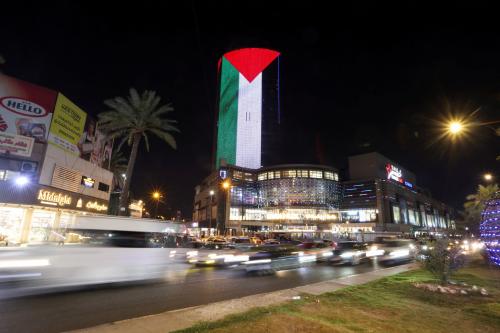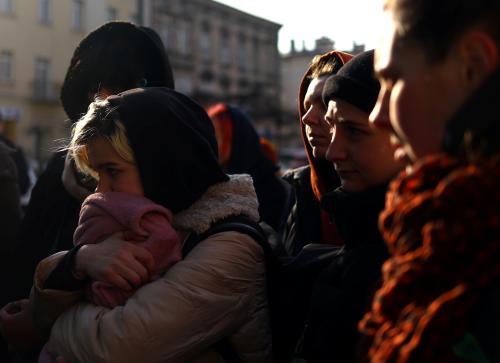According to recent news reports, the Bush administration will not ask Congress for additional foreign aid for Iraq in its coming budget request. This would be a major strategic mistake. Iraq’s infrastructure is still in mediocre shape, and most of its citizens are still seriously underemployed. Such an aid cutoff would be especially surprising coming from a president who has built his Iraq policy on an unflinching commitment to staying the course and completing the mission. Economics is a critical element of any success strategy for Iraq.
To be sure, we have poured huge amounts of money into Iraq since 2003. And of the $21 billion in reconstruction aid that Congress has appropriated since the invasion, about $8 billion remains unspent. But security demands have drained at least $3 billion of the overall total from the projects it was intended for. Planned funding for electricity has declined $1.3 billion even as workers struggle to return average electricity levels to Saddam Hussein-era production. Water and sewage projects have been cut severely, from just over $4 billion to just over $2 billion, even though at least half the population remains badly underserved by these utilities.
Some would argue that with U.S. spending in Iraq averaging at least $5 billion a month since 2003, we don’t owe the Iraqi people any more help. Their own oil, after all, provides an important source of revenue that has helped the economy grow by nearly 50 percent in the past three years. This is a fair point; just looking at aid levels alone, the $21 billion that the United States has already committed compares well with per capita spending on Western Europe during the Marshall Plan years, and it dwarfs what any other country or group of countries has provided Iraq in terms of true aid (as opposed to often unwelcome loans).
But our generosity toward Iraq is not what’s at issue. It is the safety and well-being of our own troops—and our prospects for strategic success in this critical counterinsurgency and nation-building campaign.
Most relevant are three key facts. First, while there are ample reasons for hope, Iraq’s economy is simply not in good shape. It remains hugely dependent on oil, which accounts for more than 95 percent of its export earnings. Most of the economic recovery since the invasion, moreover, did nothing more than restore Iraq’s gross domestic product to the 2002 level, itself a mediocre standard of progress given that Iraq had been under sanctions for the previous decade.
Second, the failings of the economy foster resentment, and thus support for the insurgency, among the Iraqi people. While there has been notable progress in some areas, such as telephone and Internet service, the availability of automobiles, and the number of students in school, progress in water and sanitation has been slow, and bitterness about the electricity situation is palpable. Meanwhile, unemployment rates averaging perhaps 35 percent—probably much more in Sunni Arab regions—translate into legions of young, bored, impoverished youth who provide fertile ears (and empty pockets) for the recruiting campaigns of the insurgents.
Third, despite all of our frustrations in trying to make things better, more aid can make a difference. In his speech last month on Iraq’s economy, President Bush conceded that initial U.S. efforts had been focused too much on large infrastructure. He was right, and improvements have since been made. As a result, not only are more schools being rebuilt and health clinics reopened but water and sanitation services also are gradually improving, irrigation canals are operating at prewar levels, and almost 90 percent of the demand for household fuels for cooking and heating is being met.
But rather than feeling too good about progress to date—or selectively citing progress in a few cities such as Najaf and Mosul, as the president did last month—we need to recommit ourselves to what still must be done. Despite public opinion polls indicating that Iraqi optimism about the future is anywhere from 50 to 70 percent, there are still huge numbers of citizens—many in the Sunni Arab heartland, which provides the bulk of the insurgency—who do not like what liberation has brought. They think that life is worse now, and expect it to stay bad. Moreover, many Iraqis remain unimpressed by our efforts. According to figures provided to The Post by Brig. Gen. William McCoy of the Army Corps of Engineers, fewer than 50 percent of Iraqis have themselves seen any direct evidence of U.S. efforts at reconstruction.
In addition to fully funding existing plans for infrastructure and health care, the United States should work with the Iraqi government to develop a massive job creation program. To some extent, military commanders have being doing this piecemeal with their commander emergency response program funds. But these efforts have been underfunded and unsystematic. What is needed is a Roosevelt-like pledge that any honest Iraqi who wants a job can have one.
A jobs program, designed largely to put money in people’s pockets for the next few critical years, would probably not appeal to the Bush administration’s free-market faithful. Nor would it probably be what Democrats or Republicans in Congress would most wish to trumpet to constituents when campaigning this summer and fall. But such an initiative need not and should not be cast as philanthropy. The goals, pure and simple, are to reduce the number of Iraqis willing to fire grenades at passing police officers, plant explosives along the routes of troop convoys, or otherwise aid and abet the insurgency. In other words, the purpose is to win a war that is not yet won, but must be.



Commentary
Op-edWe Can’t Stop Rebuilding Iraq
January 24, 2006